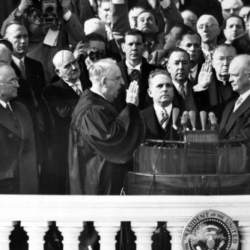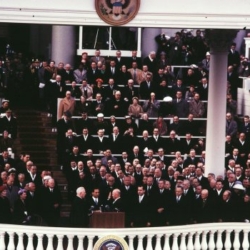Contributor(s): Shared on: 26 September 2019 under the Creative Commons Zero (CC 0) Universal license a Public Domain dedication Categories: Tags: | Contribute a translation | Source (English) |
|---|
|
Master of Healing,
who delivered His servant,
David,
from the evil sword,
and Daniel
from the lion’s den,
We, Your children,
ask Your blessing
and help
for our beloved President–
DWIGHT DAVID EISENHOWER–
who lies
upon the bed of illness. | |
We love our President
O Lord,
for he is a good and kind man.
he has led our people
through war
and Peace
to better days
and happier times. | |
We pray
that You may be with him
as he lies upon his bed.
Give him happy thoughts
to cheer his long days,
and glad remembrances
of his work
and play. | |
Make him
to know in his heart
that we all miss his smile
and his cheerful voice,
and pray
that we may see them soon
again. | |
Help his doctors,
O God,
and make his family sure
that if You are with us,
we can never be hurt.
Praised be Thou,
O Lord,
who healest the sick.
Amen. |
“Children’s prayer for the recovery of our president” was first published in Rabbi Avraham Soltes’ collection of prayers, תפלה Invocation: Sheaf of Prayers (Bloch 1959) and dated to October 1, 1955. President Eisenhower suffered a severe heart attack on September 24, 1955. Eisenhower initially planned on serving only one term, but he remained flexible in case leading Republicans wanted him to run again. While recovering from the heart attack late in September, he met with his closest advisors to evaluate the GOP’s potential candidates. The group concluded that a second term was well advised, and he announced that he would run again in February 1956. Source(s)
 Rabbi Avraham Soltes (1917-1983) was a Reform Jewish rabbi, the Jewish chaplain at the United States Military Academy in West Point, an author and a leading figure in Jewish cultural affairs. He was born in New York City. He graduated from the City College of New York in 1937 and received a master's degree from Columbia University in 1938. After being ordained in 1942 by the Jewish Institute of Religion (now HUC-JIR), he served as chaplain at Cornell and McGill Universities and then was assistant rabbi at Congregation Rodeph Sholom in Manhattan from 1946 to 1949. He subsequently served as rabbi at Temple Sharey Tefilo in East Orange and Temple Emanuel in Great Neck. He began his service at West Point as a voluntary chaplain in 1963 and was made a permanent member of the staff in 1981. His interests also took him into commerce, and from 1969 to 1974, he was vice president for community affairs of the Glen Alden Corporation, which in 1972 was merged into the Rapid America Corporation. From 1974 to 1977, he was assistant to the president of Tel Aviv University. He was credited with a key role in the establishment of the New York medical division at the university. In 1981, Rabbi Soltes received the Jabotinsky Award from Prime Minister Menachim Begin for his service to Israel. From 1977 until his death Rabbi Soltes had been the spiritual leader of Congregation Beth Chavairuth of Bergen County, in Tenafly, N.J. He participated in many cultural and educational activities that interpreted Jewish art, music and literature. He was chairman of the National Jewish Music Council from 1963 to 1969 and a member of the board of the National Jewish Book Council from 1967 to 1972. Rabbi Soltes, a commentator on Jewish music for American listeners, was the host of a radio program, ''The Music of Israel,'' on WQXR from 1974-1983. Among his writings were Palestine in Poetry and Song of the Jewish Diaspora (Master's thesis HUC-JIR 1942) and Off The Willows: The Rebirth of Modern Jewish Music (1970). Aharon Varady (M.A.J.Ed./JTSA Davidson) is a volunteer transcriber for the Open Siddur Project. If you find any mistakes in his transcriptions, please let him know. Shgiyot mi yavin; Ministarot naqeni שְׁגִיאוֹת מִי־יָבִין; מִנִּסְתָּרוֹת נַקֵּנִי "Who can know all one's flaws? From hidden errors, correct me" (Psalms 19:13). If you'd like to directly support his work, please consider donating via his Patreon account. (Varady also translates prayers and contributes his own original work besides serving as the primary shammes of the Open Siddur Project and its website, opensiddur.org.) Read a comment / Leave a comment (moderated) Works of related interest: |





![[First-year student nurses, including several Holocaust survivors, in a classroom, Beth Israel School of Nursing, Lower East Side, New York] (Roman Vishniac ca. 1949)](https://opensiddur.org/wp-content/uploads/2019/09/Roman-Vishniac-Beth-Israel-Hospital-Brooklyn-New-York-early-1940s-1.jpg)






Leave a Reply